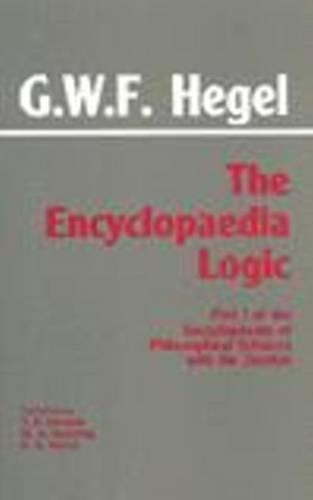
The Encyclopaedia Logic: Part I of the Encyclopaedia of the Philosophical Sciences with the Zustze
(Paperback)
Publishing Details
The Encyclopaedia Logic: Part I of the Encyclopaedia of the Philosophical Sciences with the Zustze
By (Author) G. W. F. Hegel
Translated by T. F. Geraets
Translated by W. A. Suchting
Translated by H. S. Harris
Hackett Publishing Co, Inc
Hackett Publishing Co, Inc
15th October 1991
United States
Classifications
Tertiary Education
Non Fiction
160
Physical Properties
Paperback
432
Width 139mm, Height 215mm
496g
Description
The appearance of this translation is a major event in English-language Hegel studies, for it is more than simply a replacement for Wallace's translation cum paraphrase. Hegel's Prefaces to each of the three editions of the Enzyklopdie are translated for the first time into English. There is a very detailed Introduction translating Hegel's German, which serves not only as a guide to the translator's usage but also to Hegel's. Also included are a detailed bilingual annotated glossary, very extensive bibliographic and interpretive notes to Hegel's text (28 pp.), an Index of References for works cited in the notes, a select Bibliography of recent works on Hegel's logic, and a detailed Index (16 pp.). The translation is guided by the (correct) principle that rendering Hegels logical thought clearly and consistently requires rendering his technical terms logically. . . . This ought immediately to become the standard translation of this important work. --Kenneth R. Westphal, in Review of Metaphysics
Reviews
The appearance of this translation is a major event in English-language Hegel studies, for it is more than simply a replacement for Wallace's translation cum paraphrase. Hegel's Prefaces to each of the three editions of the Enzyklopdie are translated for the first time into English. There is a very detailed Introduction translating Hegel's German, which serves not only as a guide to the translator's usage but also to Hegel's. Also included are a detailed bilingual annotated glossary, very extensive bibliographic and interpretive notes to Hegel's text (28 pp.), an Index of References for works cited in the notes, a select Bibliography of recent works on Hegel's logic, and a detailed Index (16 pp.). The translation is guided by the (correct) principle that rendering Hegel's logical thought clearly and consistently requires rendering his technical terms logically. . . . This ought immediately to become the standard translation of this important work. --Kenneth R. Westphal, in Review of Metaphysics
Author Bio
H. S. Harris is Professor of Philosophy Emeritus, Glendon College, York University.
